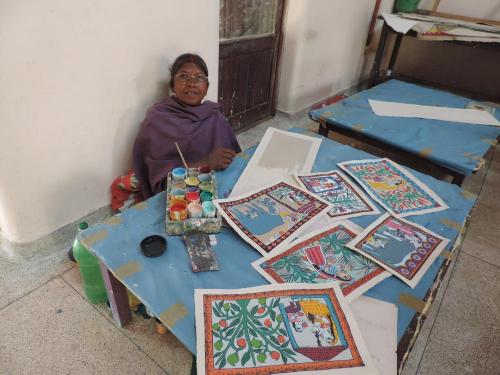
I recently visited the Janakpur Women's Development Centre (JWDC) which I found to be a hidden gem on a number of fronts. JWDC has its origins in a USAID study carried out by Clair Burkett, an American researcher, who helped to transfer rural poor Maithili women's art of wall paintings to paper for income generating opportunities. This led to the establishment of the Janakpur Women's Art Project (JWAP), in 1989 with the United Nation Development Fund for Women (UNIFEM) providing grants to run this project. In 1992, JWAP was registered under its present name Janakpur Women's Development Centre (JWDC), in Nepali "Janakpur Naari Bikas Kendra". The JWDC is the first non-governmental organization in Nepal working to empower and support women from the Maithil culture in the Janakpur area. The Centre is a member of Fair Trade Group Nepal.
JWDC's business model is based on providing opportunities for empowerment of Maithil women and operations run by local women through income generation and community development activities in Janakpur. The goals are to 1) preserve indigenous artistic heritage; 2) the creation of wealth within an impoverished local community, and 3) the empowerment of women within a culture where women’s rights and abilities are often undervalued. Beside the production of Maithili arts and crafts the Centre also provides training in literacy, management, leadership, gender awareness and basic business skills.
What JWDC does is not only provide gainful employment but also preserves local culture something which is as the Mastercard advertising campaign goes, Is Priceless!
JWDC depends quite a bit on foreigner revenues and grants to survive. I was told that Nepalis and Indians don't often go to the organisation and shop because the prices are perceived as a bit high. However when thinking more about the amount of time that it takes to, e.g. make a painting, the price is very reasonable.
Corporate Social Responsibility (CSR) activities in Nepal are often times thought of and implemented as charity, i.e. it's about giving something to someone, not necessarily sustainability, building livelihoods and other capacities, or "teaching people how to fish". This maintains a sense of dependence upon the donor and at any point the "donations" can stop.
If corporates "invested" in social business models (businesses with a human face) such as that used by JWDC one might really begin to see a turn around in the economic development of many Nepali citizens. The many duplicative "mom and pop" stores, e.g. bicycle repair shops, small convenience stores, that one can see populating the country, especially in villages, can hardly seem to provide enough family income to enable stopping the cycle of poverty. If children don't have educational options because their parents don't have the money to pay tuition fees, no matter how low, there are few alternatives, but to go overseas for employment, marry early and stop education, etc. and what kind of a life does this hold?
Corporates can invest in a number of ways. They could offer JWDC products in their workplaces for special holidays encouraging their employees to purchase, help establish a store in a commercial area, assist with marketing, provide health care or pay tuition fees for worker's children, etc. Since many of the larger corporates in Nepal have overseas links, products could also be promoted on the corporate website or visits could be paid for to other countries, especially during holiday times. This not only builds up, in this case, JWDC's business but also helps to promote the corporate as a business which cares about their community.
Not everyone is going to be able to go to a place such as Katmandu and work in an office setting for a large employer. Nepal remains a rural based country and what better way to help develop this then through preserving, e.g. traditional art but adding value through modern means of promoting.










Add new comment